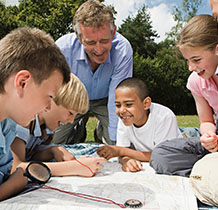Resource Database

Click on a topic or use the search box below to look for a listing:
There are 488 resources. Displaying 10 resources per page.
This article reports preliminary findings from an evaluation of Stand Up Help Out (SUHO), an afterschool camp for high school students in the Bronzeville area of Chicago. The authors sought feedback from the youths participating in the program and asked them about what they valued in the program and the types of relationships they formed. According to the report, the youths participating in the SUHO program consistently pointed out that caring and being cared for were most meaningful to them.
View Resource
Diverse Learners
This issue brief from the Afterschool Alliance closely examines the current economic state of African American and Latino communities and the far-reaching impact of poverty on academic achievement. It highlights the important role afterschool and summer programs play in supporting youth and families in these communities. The brief also outlines the challenges these programs confront in keeping pace with demand for their services and ensuring their doors stay open to continue providing resources that are highly valued in African American and Latino communities.
View Resource
Diverse Learners
The U.S. Department of Education’s Y4Y portal has added several new civic learning and engagement resources for afterschool practitioners. There are new strategies and information, as well as customizable tools, checklists, worksheets, project examples, and project planners to help practitioners develop civics projects for students. Finally, the website has new trainings-to-go and training starters to help afterschool leaders develop engaging civics professional development sessions for staff.
View Resource
Afterschool Enrichment
Designed to be used with SEDL’s Afterschool Training Toolkit for Homework, this instructor’s guide aids afterschool instructors in mastering promising practices in homework help. The guide includes instructional strategies, organizational tools, and opportunities for instructors to reflect on teaching experiences and improve their practices. Afterschool directors can use the instructor’s guide as a professional development tool with groups, or instructors can use the resource independently.
View Resource
Academic Enrichment
The Afterschool Training Toolkit for Homework from SEDL provides resources that enable practitioners to provide effective homework help in their afterschool programs. The toolkit includes an overview of four promising practices in afterschool homework help that specialists identified through a review of research and site visits to promising afterschool programs across the United States. Video clips illustrate some of the practices in action, and the toolkit also contains resources, such as a homework log and a memo template, to help afterschool practitioners monitor and communicate about student progress.
View Resource
Academic Enrichment
This report from the Wallace Foundation covers Better Together: Building Local Systems to Improve Afterschool, a national conference held in February 2013. Teams from 57 cities gathered to discuss how to improve afterschool programs and use data for informed decision making. The report covers topics such as sustainability, dropout prevention, data use, and high-quality programming for secondary students.
View Resource
This brief from The Forum for Youth Investment helps out-of-school time providers develop a better understanding of Common Core State Standards and their implementation in out-of-school time programs. It includes examples of how some programs are responding to the standards and gives recommendations on how programs might approach aligning activities with the standards. It also provides an overview of challenges and opportunities for the out-of-school time field and suggestions for implementing the standards.
View Resource
The Coalition for Community Schools has published a 9-week blog series on how community school initiatives are supporting and strengthening innovations in expanded learning opportunities. Each post addresses how districts and their community partners are finding effective ways to implement different expanded learning opportunities. Topics include summer learning, using data to make decisions about community partnerships, and innovative STEM learning opportunities with higher education institutions.
View blog series.
There are 488 resources. Displaying 10 items per page.
- Academic Enrichment
- Afterschool Enrichment
- Classroom Management
- College and Career Readiness
- Diverse Learners
- Family and Community Engagement
- Program Management
- Social-Emotional Learning
- Sustainability
- Technology
Subscribe to the Illinois Quality Afterschool newsletter and resource bulletin.
